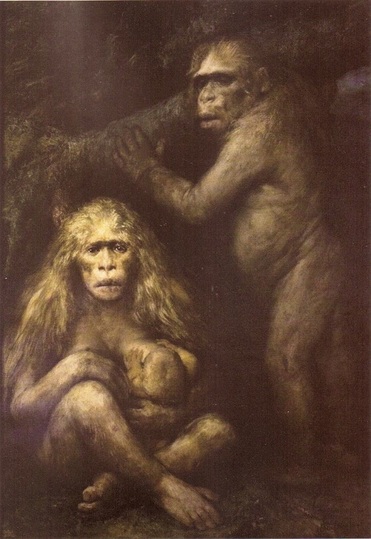I found it interesting that Haeckel was using the term Pithecanthropi years before it was used to name the "Java Man" fossils found by Eugene Dubois in Indonesia in 1891. As best I can tell, Haeckel coined "Pithecanthropi" to describe his hypothetical, speechless proto-human "missing link" between apes and humans (the earliest use of the term I can find is in the 1876 edition of History of Creation). Haeckel invented Pithecanthropi to describe something that he thought should have existed according to his model of human evolution, rather than something that could be shown to have actually existed based on fossil evidence. Pithecanthropus was a pre-construction rather than a re-construction.
 Gabriel Max's (1894) illustration of Pithecanthropus.
Gabriel Max's (1894) illustration of Pithecanthropus. (An aside: look closely at the female's right foot -- it looks to me like she has a divergent big toe. It's interesting that available fossil evidence [such as Little Foot] demonstrate that Australopithecines retained a somewhat opposable big toe like non-human apes. A grasping toe is also present in the the 4.4 million-year-old skeleton of Ardipithecus ramidus, which may or may not be a human ancestor. There is no evidence that I know of which suggests that Homo erectus had a foot significantly different from modern humans).
So why did Eugene Dubois name his fossils Pithecanthropus erectus? Was the choice of name an endorsement of Haeckel's ideas?
Yes, apparently.
Dubois wasn't a student of Haeckel's, but was apparently significantly influenced by Haeckel's ideas both in terms of the notion that there should be a "missing link" between apes and humans and fossil evidence for that creature could likely be found in tropical Asia. Dubois' decision to name the fossils he found in Indonesia Pithecanthropus is not a coincidence but a direct reflection of his appreciation for Haeckel's ideas about human evolution.
It seems that Dubois' decision to look for the "missing link" in southeast Asia wasn't just some random gamble based on an original idea he had that humans were descended from orangutans: it was inspired by Haeckel's writings. The biography of Dubois on Talk Origins doesn't mention a connection between Dubois' ideas and those of Haeckel. The New World Encyclopedia entry about Dubois also doesn't mention Haeckel (but Dubois' Wikipedia entry does). Pat Shipman's 2002 biography of Dubois (The Man Who Found the Missing Link), which I have not yet read, also discusses the connection between Haeckel and Dubois.
I think we could do a better job of confronting the history of racism in our discipline. While our current ideas about human evolution may ultimately be unaffected by whatever was in Dubois' head when he found the first fossils of what we now classify as Homo erectus in Indonesia, it isn't appropriate to try to scrub the "discovery" narrative clean of its historical and cultural context. I'm not saying that's what's happening here, but it's interesting that so many online sources of information about Dubois don't mention what looks like a fairly clear relationship between his career path and Haeckel's ideas.


 RSS Feed
RSS Feed
